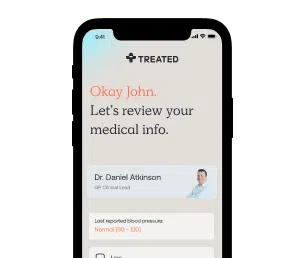Trichomoniasis
Simple treatments to clear your infection.
Secure delivery
UK clinicians
Get relief from the symptoms of the common STI: trichomoniasis, and prevent passing it to partners.
Order trichomoniasis vaginosis treatment online, with no embarrassment or judgement, at Treated.
Trichomoniasis (also sometimes known as ‘trich’) is a common sexually transmitted infection that’s caused by the parasite trichomonas vaginalis (TV). It’s usually more common in women than men, though around 50% of people don’t show any symptoms even when they have trichomoniasis.
The WHO estimates that there are around 276 million new cases of trichomoniasis worldwide each year, and that around 187 million people are infected with trichomoniasis across the globe. It’s also more common in older people, with some studies showing that most positive cases were confirmed in the over 50s.
Trichomoniasis is relatively easy to treat once you have a confirmed diagnosis and can usually be cleared up using antibiotics, which you’ll need to have a prescription for.
Anyone who has unprotected sex can get trichomoniasis. It can also be spread through sharing sex toys.
The risk of contracting trichomoniasis is higher if you are a woman.
It’s thought to be the most common curable sexually transmitted infection, although because it’s often asymptomatic, it’s hard to know for sure. Unfortunately, this means that there’ll be people who have trichomoniasis who may not have symptoms, don’t know that they have a trichomoniasis infection and may be passing it on to other people.

How we source info.
When we present you with stats, data, opinion or a consensus, we’ll tell you where this came from. And we’ll only present data as clinically reliable if it’s come from a reputable source, such as a state or government-funded health body, a peer-reviewed medical journal, or a recognised analytics or data body. Read more in our editorial policy.
Trichomoniasis is a sexually transmitted disease, anyone who has sex (or genital contact) with someone infected can get trichomoniasis. It isn’t spread through kissing or other physical contact.
If you’ve had trichomoniasis before you can still get it again. It’s estimated that one in five people get reinfected within three months of receiving treatment.
To avoid getting reinfected, all sexual partners should get treated with antibiotics at the same time. You should then wait to have sex again until you’ve been treated and are free of symptoms (usually after about a week). You’ll also likely be advised to have another test after three months to make sure you’ve not been reinfected, or you should test sooner if your symptoms come back before then.
Trichomoniasis doesn’t always cause symptoms, which can be a challenge and is probably one of the reasons why it’s thought to be so common.
The most common symptoms of trichomoniasis in women are:
The most common symptoms of trichomoniasis in men are:
Not everyone will experience all of these symptoms or in the same severity. So if you have any concerns or you want a second opinion, it’s best to go and get checked out.
Trichomoniasis rarely causes further complications but for pregnant women it can lead to low birth weight and premature births. It can contribute to short term effects on health like bronchitis, oral lesions and pneumonia.
It can also lead to genital inflammation, which may make it easier to contract other STIs such as HIV. Some studies have also shown that trichomoniasis may increase risk of cervical cancer in women and may contribute to increased instances of prostate cancer in men.

How we source info.
When we present you with stats, data, opinion or a consensus, we’ll tell you where this came from. And we’ll only present data as clinically reliable if it’s come from a reputable source, such as a state or government-funded health body, a peer-reviewed medical journal, or a recognised analytics or data body. Read more in our editorial policy.
A simple course of antibiotics, usually metronidazole, should clear trichomoniasis up in five to seven days. It’s important to finish the course, even if symptoms appear to be cleared. It’s also essential that you get tested again after your course of medication, to make sure that you’re clear of the infection.
Antibiotics are the most reliable way to clear up the infection. Stronger doses may be required if your first round of antibiotics prove to be ineffective. Sometimes one large dose can be prescribed, but this can lead to a higher risk of side effects. Starting out with a smaller dose of antibiotics that are easier to tolerate is usually preferable.
Yes, trichomoniasis always needs treatment as it’s unlikely to go away without it. If your trichomoniasis is left untreated, then the likelihood is that you will infect other people that you have sex with.

How we source info.
When we present you with stats, data, opinion or a consensus, we’ll tell you where this came from. And we’ll only present data as clinically reliable if it’s come from a reputable source, such as a state or government-funded health body, a peer-reviewed medical journal, or a recognised analytics or data body. Read more in our editorial policy.
Have something specific you want to know? Search our info below, or ask our experts a question if you can’t find what you’re looking for.
A Review of Evidence-Based Care of Symptomatic Trichomoniasis and AsymptomaticTrichomonas vaginalisInfections. Clinical Infectious Diseases, [online] 61(suppl 8), pp.S837–S848.
Trichomoniasis – are we giving the deserved attention to the most common non-viral sexually transmitted disease worldwide? Microbial Cell, [online] 3(9), pp.404–418.
Trichomoniasis in older individuals: a preliminary report from Iran. Journal of Parasitic Diseases, 40(4), pp.1597–1600.
STD Facts - Trichomoniasis. [online] Centers for Disease Control and Prevention.
Trichomonas vaginalis infection-associated risk of cervical cancer: A meta-analysis. European Journal of Obstetrics, Gynecology, and Reproductive Biology, [online] 228, pp.166–173.
Association between Trichomonas vaginalis and prostate cancer mortality. International journal of cancer, [online] 144(10), pp.2377–2380.
Treatment of Infections Caused by Metronidazole-Resistant Trichomonas vaginalis. Clinical Microbiology Reviews, 17(4), pp.783–793.

Antibiotic tablet that helps clear your infection. Taken twice daily for 7 days.

Registered with GMC (No. 4624794)
Meet Daniel
Registered with GPhC (No. 2202465)
Meet Sanjeda
Registered with GPhC (No. 2070724)
Meet Craig
Always read the leaflet that comes with your medication and tell us about any side effects you get.
We know health, but you know you.
Our experts tell you what’s safe, but you decide what’s best.
Answer a few questions and tell us about yourself. Get tailored advice from our clinicians so you can choose better.

Choose your treatment and how often you have it delivered.

We know things change. It’s the nature of life. We’ll check in regularly to make sure your treatment is still right for you.
Pause. Change. Skip. Start again. Any time you like.
Here are some other things we can help with.
Choose from our range of tablets and solutions. Get ongoing care and support from our experts.
Stop smoking treatments that can help you kick the habit forever, and reduce your risk of disease.
Tablets or injections. Tailored weight loss treatments combined with ongoing support from our experts.
We're making healthcare more about you. Sign up to our newsletter for personalised health articles that make a difference.
Disclaimer: The information provided on this page is not a substitute for professional medical advice, diagnosis, or treatment. If you have any questions or concerns about your health, please talk to a doctor.
We couldn't find what you're looking for.
Here's everything we treat. Or, if you're looking for something we don't have yet, you can suggest something.
If there’s a particular treatment or condition you’re looking for, tell us and we’ll look into it for you.
Submit your question here, or tell us if you’ve found an issue on our site.
We’ll get back to you very soon. We aim to respond to all queries in one working day.
You’re signed up to our newsletter. Keep an eye on your inbox for our latest update.
By clicking 'Subscribe now' you're agreeing to our Privacy Policy.
We’ve sent you an email asking you to confirm your email address.